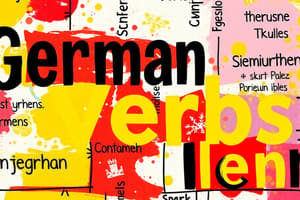Podcast
Questions and Answers
Was bedeutet das Verb 'abliegen' im Kontext der deutschen Sprache?
Was bedeutet das Verb 'abliegen' im Kontext der deutschen Sprache?
- Von etwas weg gehen oder es loslassen.
- Sich irgendwo ablegen oder zur Ruhe kommen. (correct)
- Sich mit jemandem anlegen oder streiten.
- Mit etwas abschließen oder es hinter sich lassen.
Worin besteht die Hauptbedeutung des Verbs 'anschmeißen'?
Worin besteht die Hauptbedeutung des Verbs 'anschmeißen'?
- Sich von jemandem beeinflussen lassen.
- Etwas anstecken oder aktivieren. (correct)
- Verschiedene Dinge zusammenbringen.
- Ein Gespräch beginnen oder initiieren.
Was beschreibt das Verb 'aufschwingen' am besten?
Was beschreibt das Verb 'aufschwingen' am besten?
- Schnell zu einem bestimmten Punkt gelangen.
- Sich in Bewegung setzen oder aufbrechen. (correct)
- Eine Schwingung erzeugen oder etwas schwingen.
- Sich emotional aufladen oder aufregen.
Was bedeutet 'auseinanderstieben' im übertragenen Sinne?
Was bedeutet 'auseinanderstieben' im übertragenen Sinne?
Was versteht man unter 'ausfechten'?
Was versteht man unter 'ausfechten'?
Flashcards
abliegen
abliegen
Etwas liegt an einem Ort und soll dort verbleiben.
anschmeißen
anschmeißen
Etwas schnell und leicht starten, z.B. einen Motor oder ein Feuer.
aufschwingen
aufschwingen
Etwas sehr schnell und dynamisch in Bewegung setzen, z.B. ein Schwert.
auseinanderstieben
auseinanderstieben
Signup and view all the flashcards
ausfechten
ausfechten
Signup and view all the flashcards
Study Notes
Sentence-Based Comprehension Questions
- abliegen: "Er legte die Prüfung ab." (He took the exam.)
- What does "abliegen" mean in this context?
- In what situation would someone use the verb "abliegen"?
- How does the word "Prüfung" relate to the verb "abliegen"?
- anschmeißen: "Sie schmissen den Ball an die Wand." (They threw the ball against the wall.)
- What does "anschmeißen" mean in this context? What does "an" signify in this prepositional phrase?
- Describe a similar situation in which you would use the verb "anschmeißen".
- Explain the implication of the verb in terms of force or manner of action.
- aufschwingen: "Der Vogel schwang sich hoch in die Luft." (The bird soared high into the air.)
- What does "aufschwingen" mean in this context?
- What type of action describes the meaning of "aufschwingen"?
- What is the implication of the word "hoch" in this sentence?
- auseinanderstieben: "Die Kinder stieben auseinander, als der Lehrer kam." (The children scattered when the teacher arrived.)
- What does "auseinanderstieben" mean in this context?
- What is the effect of the action implied by this verb?
- What words or phrases would you use to describe the opposite action?
- ausfechten: "Die beiden Gegner fochten das Duell aus." (The two opponents fought out the duel.)
- What does "ausfechten" mean in this context? What is the implication of "aus"?
- How does the word "Duell" relate to the verb "ausfechten"? What does it signify concerning the engagement?
- What does the verb "ausfechten" suggest in regards to the outcome of the action?
Study Notes
-
abliegen: implies a formal act of completion. It suggests finishing a task or submitting something. The related concept involves a structured process rather than a spontaneous action. The prepositional element "ab" suggests something is removed/completed at a definite point/time, rather than just laying it down.
-
anschmeißen: indicates throwing something forcefully, often against a surface. The preposition "an" specifies the direction or target of the action, suggesting a forceful impact with a definite place as a result.
-
aufschwingen: implies a rapid, forceful lifting or elevation, often into the air. It strongly suggests movement and elevation, indicating a dynamic and impressive action. "Aufschwingen" implies a more active and powerful motion than simply "schwingen" (swing).
-
auseinanderstieben: signifies a rapid scattering or dispersal of something, often in response to an event. This implies a rapid and likely chaotic dispersal in different directions.
-
ausfechten: implies a complete or decisive struggle. The "aus" prefix suggests the confrontation has been brought to completion or conclusion. The action strongly suggests resolution after a contest or dispute. This differs from simply "fechten" which could imply any fighting without implying completion.
Studying That Suits You
Use AI to generate personalized quizzes and flashcards to suit your learning preferences.



